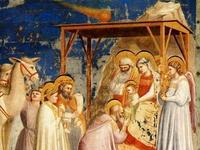 The Feast of the Epiphany
The Feast of the EpiphanyJanuary 6th
Some Christians are grateful for the feast of the Epiphany ('the manifestation (epiphaneia) of Christ to the gentiles') on 6 January each year because it offers a second-bite at the greeting card cherry: any number of Christmas cards carry the familiar Three Kings as the artwork, and if not posted by December 25th, they won't look at all out of place in early January. Indeed, it may even imply a certain textual and theological superiority on the part of the sender.
The cameo by the magi - the 'wise men' - in Matthews infancy story (2:1-12) has been encrusted over time with many well-intentioned details, not least of which is the confident ascribing of the number 'three' (not mentioned by Matthew); their status as 'kings' (Tertullian called them fere reges, 'almost kings'); and even names (Gaspar, Melchoir, and Balthasar, which monikers arose spontaneously in the sixth century).
Their fame lives on, and they are recurring stars (no pun here) of stage, screen and Sunday School tableaux, where many a bed sheet has been sacrificed in their honour.
From William Wyler's Ben Hur (1959), to Catharine Hardwicke's The Nativity Story (2006), there is no telling of the birth of Jesus without these three, to whose enduring memory everything from incense to playing cards to a very pleasant pub in Clerkenwell, London, has been named.
But what does Epiphany mean?
At very least, it seems to me that Matthew's take-home message is that God has had enough of the barriers which divide, and that God's passion is - and always has been - for the world.
Matthew's artfully structured story makes great good sense when it is re-read/re-told in the light of the dramatic epilogue to this gospel, the so called Great Commission. In the Epiphany, cast as it is in the opening scenes of Matthew's Gospel, the infant Jesus is revealed to a select but representative group of outsiders: 'the nations' have come to light that God has focused in the pinpoint of one truly human life. When the curtain comes down, the risen Jesus turns the inside out with the command to go and make disciples of 'all nations'.
Whether or not there were three, four, or any number of Magi (Matthew's Greek plural); and no matter their assumed status as professional astrologers , interpreters of dreams, and masters of secret arts; whether they were high-born or self-made of peasant stock, the walls began to crumble. And woe to those who seek to re-build them - a thread which runs through Matthew's telling - to keep out those whom God is letting in.
What became of these strange 'almost kings' after their privileged moments in the light, and their dangerous audience with Herod? With no apparent regard for a good ending, the storyteller simply sends them home - but with the broadest hint that things are different now. The walls are down....
The cameo by the magi - the 'wise men' - in Matthews infancy story (2:1-12) has been encrusted over time with many well-intentioned details, not least of which is the confident ascribing of the number 'three' (not mentioned by Matthew); their status as 'kings' (Tertullian called them fere reges, 'almost kings'); and even names (Gaspar, Melchoir, and Balthasar, which monikers arose spontaneously in the sixth century).
Their fame lives on, and they are recurring stars (no pun here) of stage, screen and Sunday School tableaux, where many a bed sheet has been sacrificed in their honour.
From William Wyler's Ben Hur (1959), to Catharine Hardwicke's The Nativity Story (2006), there is no telling of the birth of Jesus without these three, to whose enduring memory everything from incense to playing cards to a very pleasant pub in Clerkenwell, London, has been named.
But what does Epiphany mean?
At very least, it seems to me that Matthew's take-home message is that God has had enough of the barriers which divide, and that God's passion is - and always has been - for the world.
Matthew's artfully structured story makes great good sense when it is re-read/re-told in the light of the dramatic epilogue to this gospel, the so called Great Commission. In the Epiphany, cast as it is in the opening scenes of Matthew's Gospel, the infant Jesus is revealed to a select but representative group of outsiders: 'the nations' have come to light that God has focused in the pinpoint of one truly human life. When the curtain comes down, the risen Jesus turns the inside out with the command to go and make disciples of 'all nations'.
Whether or not there were three, four, or any number of Magi (Matthew's Greek plural); and no matter their assumed status as professional astrologers , interpreters of dreams, and masters of secret arts; whether they were high-born or self-made of peasant stock, the walls began to crumble. And woe to those who seek to re-build them - a thread which runs through Matthew's telling - to keep out those whom God is letting in.
What became of these strange 'almost kings' after their privileged moments in the light, and their dangerous audience with Herod? With no apparent regard for a good ending, the storyteller simply sends them home - but with the broadest hint that things are different now. The walls are down....
Article from: The Perth Diocesan Magazine - by The Rt Revd Mark Burton - Bishop of Perth, Northern Region, Anglican Church of Australia
No comments:
Post a Comment